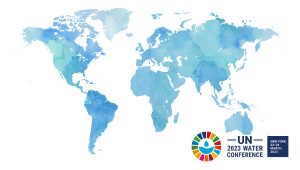Influencing sustainable water management through strategic investment decisions
Can investors contribute to a water wise world? A new report authored by Dr Thérèse Rudebeck, Programme Manager at Swedish Water House, and Sarah Breslin, SIWI’s Gender focal point and Programme Officer in the International Policy Department, present a clear case that investors not only can, but must ensure that financial flows have a positive water impact for a water wise world to be possible.
Investors can directly impact water management on the ground by strategically investing in companies which engage in sustainable water practices. By directing financial flows towards these companies, which have a positive water impact, and putting pressure on holding companies with lower sustainability standards, investors can significantly influence the protection of our shared water resources. However, “there are few methodologies available to investors who wish to screen their portfolios through a water lens, and incorporate water into investment strategies. This prevents constructive engagement” says Dr Rudebeck.
Responding to this challenge Sweden’s Sustainable Investment Forum (Swesif), together with CDP and SIWI, initiated a water project exploring how to understand and integrate water risks and impacts into portfolio analysis. The resulting report Accounting for Water in Active Ownership, published today, examines three equity portfolios of differing size and nature. They are analysed using a specifically developed three-step methodology to narrow down a shortlist of companies belonging to high risk/high impact sub-industries. Investors can use this methodology to help them identify companies which constitute high-risk holdings, and thereby prioritise their water engagement.
For investors that want to develop direct engagement with companies, the report recommends that dialogues focus on pushing companies to develop a strong water management strategy, strengthen value chain engagement, and recognise water quality issues as equally important as water quantity issues. The report analysis shows that these ideals for sustainable water management are generally weak across companies of all different sectors. Moreover, the data currently available to support investors in making water-related decisions contains shortcomings, inconsistencies, and gaps.
The report strongly urges investors to become a signatory to CDP to support enhanced water disclosure, and engage with policymakers to ensure increased public transparency, enabling improved data sets from ESG risk rating firms.
Editor's note
ESG stands for Environmental, Social, and Governance and refers to a set of criteria for investors to screen potential investments for collective conscientiousness on social and environmental factors. CDP, formerly known as the Carbon Disclosure Project, is a non-profit organization that helps companies and cities disclose their environmental impact.







